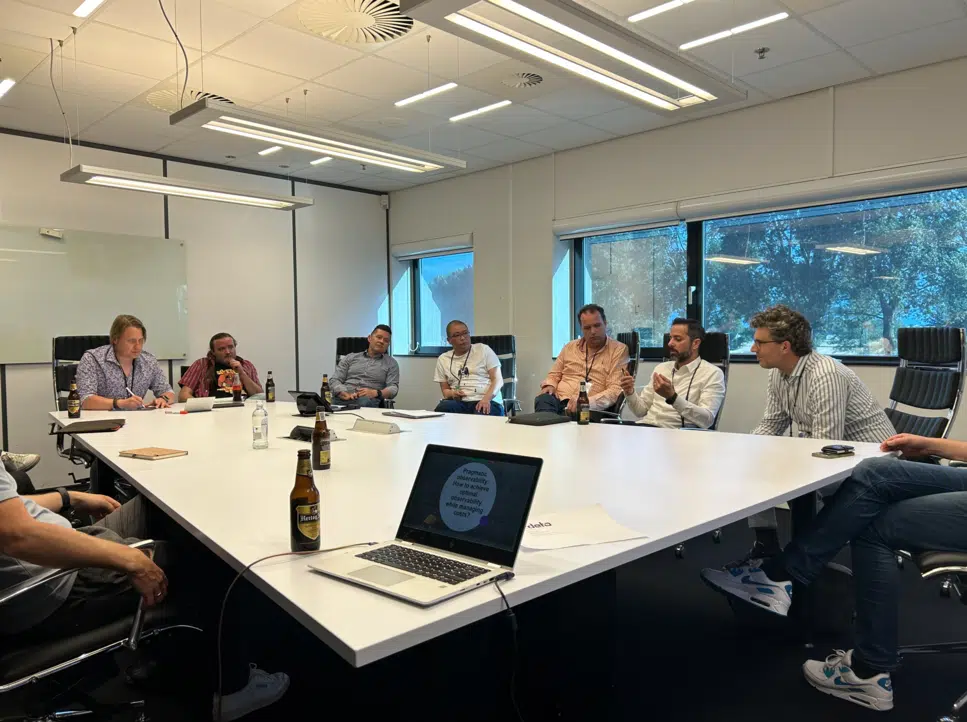In the latest in our #TechQA series, we talk all things tech with Elliott Thwaites, Head of Technology at Ladbrokes Coral.
Elliott discusses how the role of tech teams has changed throughout the years, skills gaps in the tech market and offers his advice to firms looking to transform their digital processes.
Third Republic (TR): Could you start by giving us an overview of your background?
Elliott Thwaites (ET): I came from a completely non-technical background. I studied Geography at university, but always had a passion for technology which led me to looking at technology-based grad schemes for when I left university.
The first job I had was at Sky – I got onto the technology grad scheme there and got to be involved in four different roles across technology. The scheme mostly took me on a journey through project management, operations and analysis.
TR: How did you get to where you are today as the Head of Technology at Ladbrokes Coral?
ET: Following my grad scheme, I decided that I’d like to pursue a technical analyst role.
From there I was able to progress up the ranks, from associate up to a senior role. Eventually I ended-up as a Solution Engineering Manager, which essentially saw me manage a team of technical and business analysts, as well as solution architects. The team worked on some of Sky’s major internet video streaming applications.
After 5 and half years at Sky I moved onto my role as Head of Technology at Ladbrokes Coral.
TR: What does your role as Head of Technology at Ladbrokes Coral involve?
ET: I was originally brought into Ladbrokes Coral as Head of Reliability Engineering with a specific focus on building an SRE function. It was a completely new concept to the business at the time.
Since then, things have progressed, and I’ve moved up into the Head of Technology role and I now I still have the main responsibility for the SRE function, as well as DevOps, Cloud Architecture and Technical Risk teams.
TR: What advice would you give to those starting out their career in tech?
ET: First and foremost, I would say it’s important to be open-minded about where you want your journey to go. There’s an awful lot of roles in technology that don’t require you to necessarily be a highly technical person. There is an awful lot of space in the industry for people who have good heads for management, ideation and even product roles.
When getting into a career in tech, it’s important not to pigeonhole yourself too early on. Make sure you get broad experiences, whether it’s at university or within a particular business, make sure you remain open to opportunities and do what’s right for you. For example, if you did a technical degree, don’t feel like you have to go into a developer role.
TR: Have you noticed any skills gaps in new technical talent in the industry?
ET: One of the main things that I have noticed is that there is a very clear swing towards new cloud technologies. A lot of the emerging talent I see, understandably, want to work on these cloud technology platforms, such as AWS, GCP or Azure. They want to be working in this newfound DevOps world, which is absolutely needed.
This does mean, however, that emerging talent can be quite difficult to find in more traditional technologies, which have absolutely still got their place. There are many industries that require talent in on-premise infrastructure technologies or management of data centres and some of the older, less cutting edge languages.
TR: What is the biggest change you have seen in the industry?
ET: The biggest change I have seen is the speed at which technology is required to be delivered to market. Through speaking to my network, everything is about the now. It’s a very interesting time to look into consumer behaviours and how people use technology in their day-to-day lives.
As a general rule now, if a service or product isn’t available immediately, it’s too long and people lose interest. Off the back of this, businesses are increasingly wanting to get their services and products out to market more quickly to keep customers interested.
TR: How do you think the role of tech teams in businesses has changed over recent years?
ET: Tech teams in general have become more empowered over the years. Going back to when I first started out, it was very much a case of being told the requirements and delivering these. Whereas tech teams are now a bit more switched on to how they work. There’s a lot more innovation happening now in order to make delivery of products more efficient – I see this a lot in the DevOps world.
There’s a lot of tools and providers out there that are helping tech teams to increase their productivity, scalability, stability and quality levels in delivery. There’s a lot more freedom and innovation now around how these teams operate and how they deliver. There’s also a lot more demand for freedom, which I think is a good thing. Tech teams are a lot more dynamic now.
TR: What changes do you predict for the future of tech teams?
ET: I think the demand will continue on tech teams to be more innovative, to take more control of their own domains and how they deliver. I think there will be a continuation in the trend of teams relying on internal and external networks of people a lot more as well.
There’s a lot of buzz around at the moment with regard to DevOps meetups. It’s becoming more important to build cultures of DevOps that don’t necessarily just sit within a certain business, but also drawing on knowledge from other businesses and other domains that have been on the DevOps journey.
TR: How do you think businesses can adapt in these changing times?
ET: This is an interesting one. I think initially it depends on the size of the business, smaller businesses and startups can adapt a lot more easily. They have an opportunity to get things right the first-time round.
What I’d say about longer running businesses, businesses that have complete digital transformations that they need to implement, maintaining a focus on quality is the best thing you can possibly do.
There’s an awful lot of desire across technology to get things out quickly, but getting quality product out, is second-to-none in my opinion. I think businesses need to maintain a focus on ensuring that they don’t risk reputation due to a compromise on quality.
TR: What does digital transformation mean to you? What challenges and opportunities do you think it presents?
ET: Digital transformation can be quite a woolly term and means many different things to different people. What I would say is that it’s about adapting processes and systems to deliver quality products, efficiently and provide customers with the best service.
In terms of challenges; some businesses might have monolithic systems that they want to transform, and these things take time to architect properly and figure out how it’s going to be delivered from a methodology perspective. It’s not a quick fix and takes a lot of planning.
From an opportunity’s perspective; it brings the opportunity to be something different. Revisiting processes and systems will always be a positive thing in my opinion, because it gives you the chance to reflect on where you can improve. This isn’t something that naturally comes until you start to take steps toward digital transformation. It’s also an opportunity to bring in new talent and new skills to the business.
TR: What advice would you give to businesses looking to transform their digital and technological processes?
ET: The focus on quality is definitely paramount. It’s also important to take the time to enter the journey in the right frame of mind. Ensure that you bring everyone in the organisation along on the journey with you. Getting every role and every team involved in the process is fundamental to getting a transformation process right.
Some business think it might be a top down thing or even a bottom up thing, but I think it needs to be something that everyone is bought into – I think that goes for any sort of change that is implemented. Ensuring that everyone understands why and understands the vision is key, if you don’t communicate changes then it’s going to be more difficult to get everyone bought into it.
For me, it mainly comes down to the people aspect. There are always going to be challenges from the technical side of things, but they’ll always be ways that you can work around these and move on to the next step. However, from a culture perspective bringing everyone along with you on that journey is really important.
TR: What emerging digital and technological trends are you most excited about and why?
ET: Things have changed so much in terms of technology since I was growing up and the days of dial-up internet, so I’d say the key thing that I’m excited for is to see how the advancement of new technologies such as AI, will develop consumer behaviours. It’s exciting to think about where we’ll be in the future and how society and customer behaviours will continue to adapt.
If you’re looking to source top technical talent or would like to be involved in our next Q&A, get in touch with us today!




